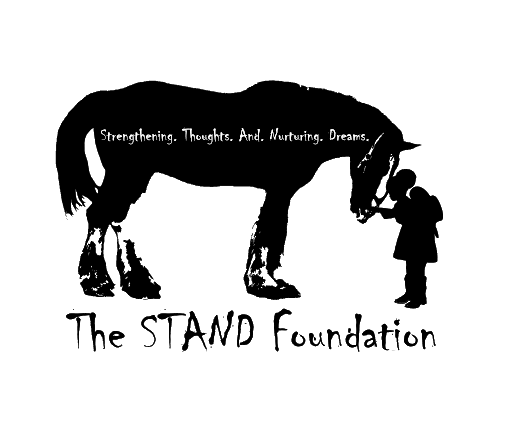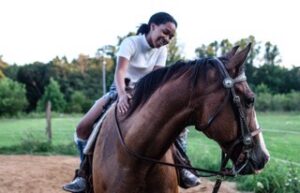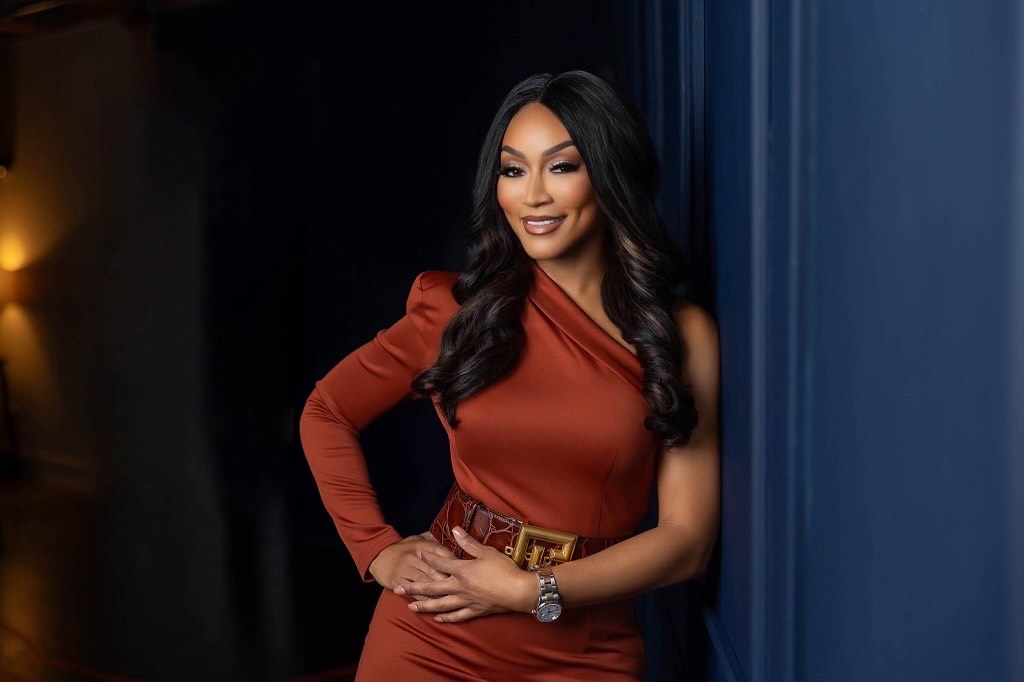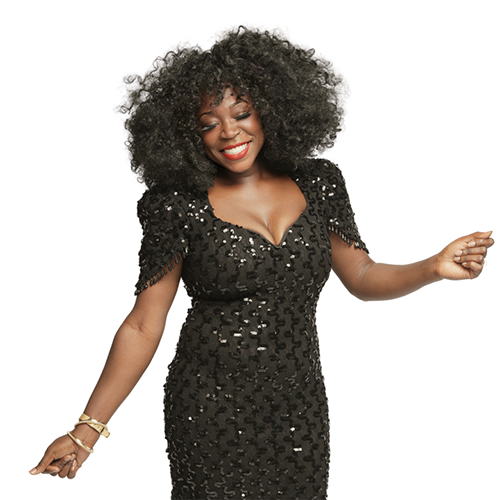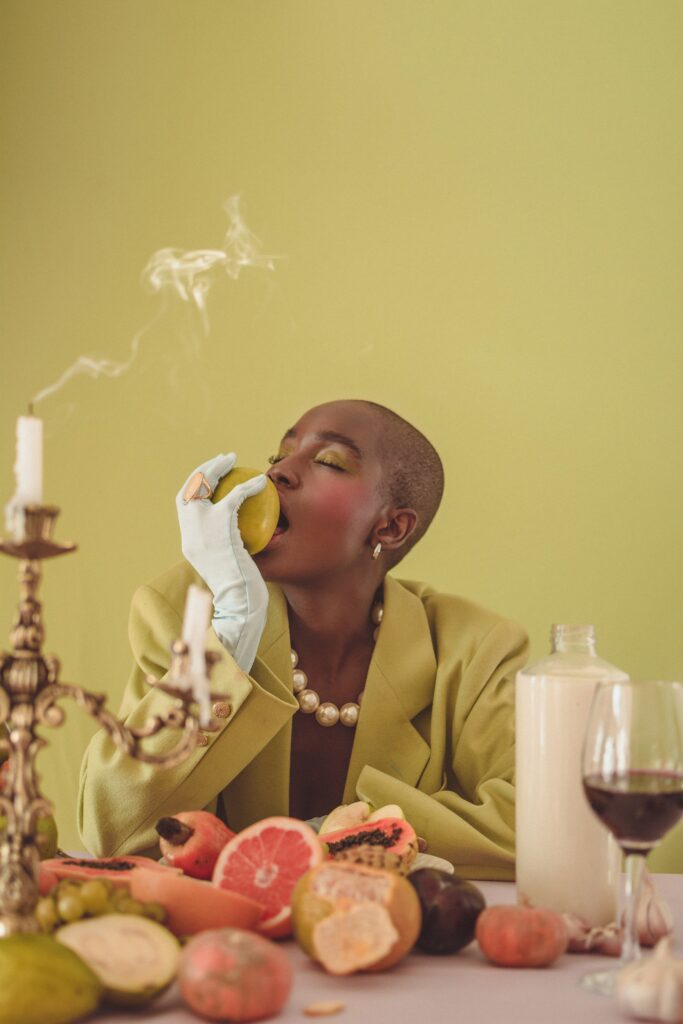All parents wish the best for their children. For their child to grow, learn, and live a well-rounded life full of opportunity. To have fun-filled, positive, social experiences. But not all parents have the time, tools, or resources to accommodate such activities. Especially, if you are a single parent, live in an impoverished neighborhood, and your child’s school or school district lacks funding. It’s rough out here. And it’s harder to just be a kid in today’s society with bullying, social media, and the current climate of today’s society. Not to mention the pressure of being a responsible student and sometimes, mom or dad’s little helper. There is only so much a child can endure, and an emotional release is needed.
Now, comes the STAND (Strengthening Thought and Nurturing Dreams) Foundation. The STAND Foundation is a nonprofit organization for youth and young adults based in Washington, D.C. The organization provides programs and workshops for inner-city youth to gain knowledge, skills, and confidence, through equestrian and rodeo readiness training. The STAND Foundation offers a holistic approach to help youth and young adults learn life skills such as self-sufficiency and positive decision-making. Program participants can achieve a healthier emotional and social well-being through recreational activities, positive social engagement, and outdoor learning that embraces nature.
In a recent interview with FEMI magazine, Selina “Pennie” Brown, founder and C.E.O of the STAND Foundation, shares how the organization came to be, the emotional bond between child and horse, and how one child’s life was impacted by the program.
How did the STAND Foundation get started?
“There was a need in the lives of our black and brown babies that were not being met or fulfilled. As a mom of an amazing 23-year old son, I was very passionate about the well-being of our youth. I wanted to ensure that my son had every possible opportunity to be exposed to cultural and diverse schools, programs, and communities to offer him a different quality of life. I did everything in my power to ensure that he had an opportunity for a better quality of life than I did growing up. This was why I moved away from my hometown in D.C. and enrolled my son in public and private Montessori schools in other counties and states.
“As a result, I was exposed to a community of people that expressed genuine concern for the well-being of the people. They offered unique programs and workshops that were effective for both child and parent. As I returned home to D.C., I noticed that programs such as art, music, physical education, and recess had been removed from the day school programs due to budget cuts starting at the elementary grade level. They were now being replaced as after school programs that brought their own resources, funding, or raised funds for programs. I decided to get involved to bring the type of cultural programming that our black and brown kids need back to the schools and community centers collaborating with black and brown teaching artists and facilitators. Hence why the STAND Foundation was created and the Equestrian Everything program was birthed.”
What knowledge and skills can inner-city youth learn from your programs?
“This will be accomplished through adapting content from The 7 Habits of Highly Effective People. The 7 Habits is a synthesis of universal, timeless principles of personal and interpersonal effectiveness, which are secular in nature and common to all people and cultures. In kid’s language, the 7 Habits of Happy Kids include: Be proactive; Begin with the end in mind; Put first things first; Think win-win; Seek first to understand, then be understood; Synergize; and Sharpen the saw. These unique programs are necessary to recapture the optimism of our youth. The program will focus on leadership, responsibility, accountability, problem-solving, adaptability, communication, initiative and self-direction, creativity, cross-cultural skills, and teamwork.
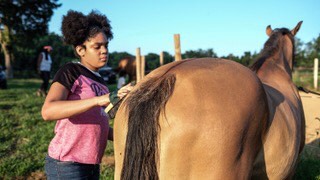
“Youth are learning to become self-aware, mindful, thoughtful of others, nutrition facts, health benefits of food, proper handling, and storage, hygiene and grooming, horse care, horse safety, horse behavior, horse anatomy, horse health and horse riding disciplines. The sessions incorporated guided safe horse interactions, virtual instruction, positive interaction between students, animals, and adults as well as the incorporation of grade-level-appropriate reading, writing, art, and math skills. These approaches, combined with varied and very specialized teaching staff, helped to reengage students, and recreate a positive learning experience that carried over into the students’ traditional classroom experiences.”
What is the significance of using horses in your programs?
“Horses are naturally wild animals until domesticated by humans and made to do unnatural things that they may or may not want to do. Horses are always judged by their appearance and/or behaviors and attitudes. Horses are therapeutic and gentle. The horse looks for honesty in interaction, and purity of character. Horses tend to mirror our interactions and behaviors and provide feedback through non-verbal communication. For the participants in the program, this may be the first chance they can experience what it is like to be judged as a person, and not as a test score. The use of the horse in the program sessions, combined with the integration of leadership and the life skills classroom component, address the participant as a unique and resilient entity. This, in turn, will facilitate youth to acquire many positive life skills and the understanding and acceptance of their need to succeed in education and life.”
And what is the relationship between the child and horse?
“The relationship between a horse and a child is a really special bond. Our goal is to pair youth with a horse that best matches the personality of the child. Every child is different just like every horse is different, and we want to cultivate an environment where both horse and child can thrive together. Because of COVID-19, we have been limited in the access we have to horses. Thankfully, the STAND Foundation has been able to collaborate with others that either have horses or access to horses where we have been able to give youth interaction with horses both physically and virtually. In their interactions, they learn that horses communicate in a similar but different way. Horses communicate through body language; they can’t talk like we do. As the child interacts with the horse, they learn to be empathetic, patient, and understanding. They will learn that it is their responsibility to communicate in a way that is understandable for the horse. And as they learn to communicate with the horse, it, in turn, helps them to better communicate with others. Through this, they learn to be more considerate and compassionate, which in turn is one step closer to making the world a better place for everyone.
What psychological effect can a child experience in their bond with a horse?
“This, in turn, will facilitate youth to acquire many positive life skills and the
understanding and acceptance of their need to succeed in education and successful transition to adolescence. The use of horses has a deeper meaning for a child that has been pressured academically, bullied, and possibly suffering any kind of trauma in the traditional educational system, home, and community. These individuals are able to connect to another living, breathing creature, without the fear of judgment. The participants quickly learn that their interaction with the horses is not jaded; it is not based on preconceived notions of their past, their grades, or of their behavioral difficulties.”
“Again, horses look for honesty in interaction, and purity of character. Horses tend to mirror our interactions and behaviors and provide feedback through non-verbal communication. For the participants in the Equestrian Everything Program, this may be the first chance they are able to experience what it is like to be judged as a person, and not as a test score. The use of the horse in the program sessions, combined with the integration of a leadership and life skills classroom component, address the participant as a unique and resilient entity.”
Can you share your most memorable story on how the STAND Foundation impacted a child or adolescent’s life?
“A 9th-grade student was entering high school for the very first time. She was a highly intelligent and extremely creative artist. She was always smiling in the hallways with her friends. The public high school she attended had a high dropout rate and low student enrollment rate. One of our responsibilities to the school was to increase enrollment and retain students hence reducing the dropout rate. The story of the young lady I am sharing with you is about a big sister who is responsible for “helping out” with her 2 little brothers while mom works the night shift. She expressed that she doesn’t feel like she is able to do anything for herself. She cooks, cleans, helps with homework, and all to support mom who is working. School is also what she feels she is doing for everybody else including mom because she is bored at school and does not want to be there.”
“As we provided a recruiting session on the lawn of an inner-city high school, she was one of many who connected instantly with the horse and did not want to go back to class afterward. She wanted to stay outside and bond with the horses. So, graciously the teachers obliged. She was one of the students registered in the program who never missed a session until one day she got suspended from school. Before her suspension, I was unaware that she played hooky from class. I heard of the news by calling her to see where she was one day. I immediately went to the school administrators, teachers, and her mom to discuss a more effective plan because they had also removed her from the after school program where she loved the Thera Art workshops and the mindfulness session.
“She was able to open up and express herself during a sister circle shedding tears of pain and misunderstanding. And she has the most precious bond with one of the horses, she could not wait to go see him. Long story short, once they removed her from the program, she came to me and said “I ain’t gonna do nothing they want me to do since I can’t do anything that I want to do for me” and that’s when the intervention came into play. It took a little more to persuade mom and to help her understand the impact it would have on her child had she not allowed us to show her that we can help with these animals and our program.”
“The student was accepted in the program with agreements to adhere to. Such as completing all assignments, attending school daily, and not skipping any classes. In doing so, she was reinstated in the program. She exceeded her teacher’s expectations on her test scores, and she was able to advance her riding level which was her goal entering the program for riding. Not only was her enrollment sustained, but she also excelled academically. And she achieved her personal goals and was able to do everything for others and herself in a positive manner.”
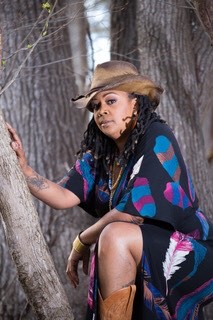
What is some of the feedback you receive from parents after their child completes one of your programs?
“One of the survey questions asked was “What did you like the most about the equestrian everything program?” and “What would you tell people about the programs?” Below are the parent’s responses.”
“The fact that it allows minorities to participate in learning and experience something different and new that they might not get from another program,”
“The program provides children a basic understanding of horses and how to care for them. Joining the program will allow a child to gain confidence around often misunderstood animals. Provides an early education of empathy towards other living creatures.”
“The Equestrian Everything program is a well-organized, affordable, whole-child experience for young African American kids in Washington, DC. I am very happy my child participates, and I highly recommend it for others.”
If you live in the D.C. area, check out The STAND Foundation with your child for an experience filled with love, adventure, and positive connections.


